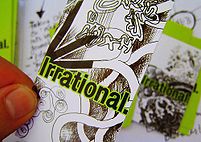Irrational thinking
Irrational thinking occurs when an individual's patterns of thinking about himself or the world are not based on objective reality. Irrational thinking often involves cognitive biases, delusionary thinking and illogical thinking (See also: Logic and Logical fallacies).
Contents
Cognitive biases caused irrational thinking
See also: Cognitive bias
- All-or-nothing thinking. Failing to see pros/cons, nuances or valid alternative perspectives.
- Jumping to conclusions: Making decisions without all the necessary facts to make a sound decision.
- Overgeneralization: Applying the outcome of a single situation to each and every similar situations
- Magnification and minimization. Focusing solely on the negative aspects of a situation and ignoring any positive aspects
- Emotional reasoning. Allowing your emotions to dictate your thinking rather than better inform your reasoning.
- Personalization. Believing that others' actions or opinions are a direct reaction to you when they are not.
- Catastrophizing: Forecasting the worse possible outcomes. Jumping to the worse possible conclusions.
- Labeling: Giving yourself or other a negative label based on a specific situation or behavior rather than the totality of their behavior. Ignoring recent positive behavior.
Characteristics of delusionary thinking
See also: Delusion and Pride and Superiority complex and Egocentric thinking and Hubris and Evidence-based thinking and Intellectual humility
- Unwavering belief that what they think is real despite all evidence to the contrary
- Persistence of holding the belief in spite of all evidence to the contrary
- Defensiveness when the delusionary belief is challenged. See also: Denialism and Rationalization
- Person holding the delusionary belief has an exaggerated sense of self-importance. See also: Pride and Superiority complex and Egocentric thinking and Hubris
- Person holding the delusionary belief has an exaggerated sense of their competence. See also: Dunning-Kruger effect and Intellectual humility
- Behaviorial changes commonly associated abnormal thinking and behavior (Obsessive thinking, compulsive thinking/behavior, negative thinking, paranoid thinking, depression, etc.)
Illogical thinking
See also: Logical fallacies and Logic and Critical thinking and Evidence-based thinking
Illogical thinking is characterized by reasoning that:
1. Lacks coherence. Two of the definitions that the Merriam-Webster online dictionary gives for the word incoherent is "lacking orderly continuity, arrangement, or relevance" and "lacking normal clarity or intelligibility in speech or thought".[1] The Collins English dictionary indicates concerning the word incoherent: "If someone is incoherent, they are talking in a confused and unclear way... If you say that something such as a policy is incoherent, you are criticizing it because the different parts of it do not fit together properly."[2]
2. Jumps to premature conclusions without sufficient evidence. See: Evidence-based thinking
3. Relies on personal biases rather than facts/evidence and sound conclusions. See: Evidence-based thinking
4. Often includes distortions like overgeneralization, wishful thinking, magical thinking, or faulty cause and effect relationships
5. Frequently leading to conclusions that don't logically follow from the presented information. This often manifest itself via making assumptions based on limited data, ignoring relevant details, or interpreting situations in a highly subjective manner rather than an objective manner.
Rational thinking
See also: Rational thinking
Rational thinking refers to one's ability to process information/data and engage in decision making and problem solving based on logic, facts, and evidence rather than on illogical thinking, irrational thinking, delusional thinking, cognitive biases and personal biases.
How to think more rationally
See also: Rational thinking and Rationality and Logical reasoning and Evidence-based thinking and Analytical thinking and Critical thinking and Structural thinking and Systems thinking and Scientific method and Problem solving and Openness and Intellectual humility and Intellectual curiosity and Creativity and Change management and Emotional intelligence and Self-awareness and Self-regulation and Metacognition
To think more rationally, use the following practices to engage in rational thinking:
1. Use logical reasoning, evidence-based thinking, analytical thinking, critical thinking, structural thinking and systems thinking.
2. Use the reasonable person standard used in the field law when engaged in decision making. "This is a common law idea, which asks the question of how a reasonable person would have behaved in circumstances similar to those with which the defendant was presented at the time of the alleged negligence."[3]
3. Analyze problems/situations logically when engaged in problem solving. See: Problem solving and Creative problem solving
4. Questioning your assumptions. See also: Openness and Intellectual humility and Intellectual curiosity and Creativity
5. Being observant and open to engaging in experimentation in order to optimize results. See also: Observation skills and Scientific method and Deliberate practice and Comfort zone and Peak performance and Openness and Creativity and Innovation
6. Being open to changing your mind based on new evidence. See: Openness and Intellectual humility and Intellectual curiosity and Creativity and Change management
7. Seeking out information from diverse perspectives. See also: Openness and Creativity and Innovation
8. Focus on actively identifying and managing your emotions. Avoiding impulsive judgments based solely on feelings. See: Emotional intelligence and Self-awareness and Self-regulation and Metacognition
9. Plan and organize your life/activities to a reasonable degree allowing for unforeseeable circumstances, common sense flexibility/adaptability and God's will. Prioritize your activities in a way to best optimize your future. Make the best use of the resources you have available. See: Planning and and Organizational skills and Time management and Forecasting and Creativity and Problem solving and Resourcefulness
Quote
See also: Self-deception
- "No rational argument will have a rational effect on a man who does not want to adopt a rational attitude." - Karl Popper
- "Above all, don't lie to yourself. The man who lies to himself and listens to his own lie comes to a point that he cannot distinguish the truth within him, or around him, and so loses all respect for himself and for others. And having no respect he ceases to love." - Fyodor Dostoevsky
- "This is an evil in all that is done under the sun, that the same event happens to all. Also, the hearts of the children of man are full of evil, and madness is in their hearts while they live, and after that they go to the dead." - King Solomon (Ecclesiastes 9:3)
Books
- Predictably Irrational, Revised and Expanded Edition: The Hidden Forces That Shape Our Decisions by Dr. Dan Ariely. ASIN: 0061353248. Harper Perennial. April 27, 2010
- The Thinker's Way: 8 Steps to a Richer Life by John Chafee. The Thinker's Way : 8 Steps to a Richer Life
- The Art of Thinking Clearly by Rolf Dobelli. Harper Paperbacks; Reprint edition (May 6, 2014)
See also
- Rationalization
- Self-deception
- Excusitis
- Limiting beliefs
- Self-sabotage
- Subconscious
- Unconscious
- Russophobia
External links
- How to Stop Irrational Thoughts by Katharina Star, PhD
- What Are Irrational Thoughts And How Can I Combat Them?
- Reframing unhelpful thoughts
- What Causes Irrational Thoughts and Can You Manage Them?
Video:
- How to deal with irrational people - video playlist, Video playlist
Notes
- ↑ Incoherent, Meriam Webster online dictionary
- ↑ Incoherent, Collins English dictionary
- ↑ Professional negligence and the reasonable person test



